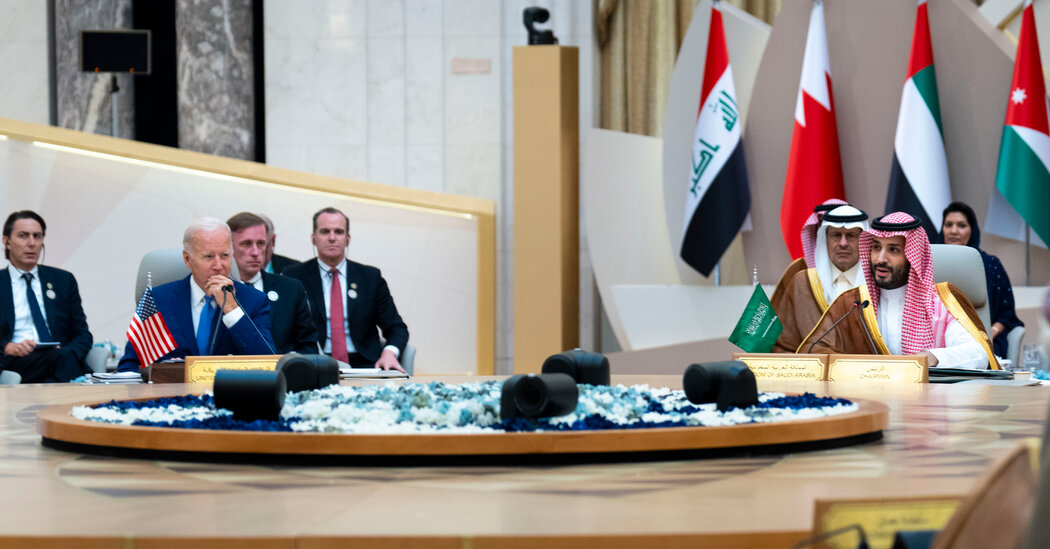JEDDAH, Saudi Arabia — As President Biden told the tale, it sounded pretty dramatic.After meeting with Crown Prince Mohammed bin Salman, Saudi Arabia’
JEDDAH, Saudi Arabia — As President Biden told the tale, it sounded pretty dramatic.
After meeting with Crown Prince Mohammed bin Salman, Saudi Arabia’s de facto ruler, on Friday for the first time since taking office, the president insisted that he had pointedly blamed him for the murder of the columnist Jamal Khashoggi.
“He basically said that he was not personally responsible for it,” Mr. Biden recounted to reporters. “I indicated that I thought he was.”
The only hitch? That’s not the way it happened, according to Saudi officials. Adel al-Jubeir, the Saudi minister of state for foreign affairs, who was present for the encounter, told reporters that he had not heard the president blame the crown prince.
The White House on Saturday did not back down. “The president was very clear about the conversation, and we stand by his account,” said John Kirby, the coordinator for strategic communications at the National Security Council.
Both sides had an interest in spinning the closed-door meeting. Mr. Biden has been denounced by rights groups, media organizations and politicians in both parties for meeting with the crown prince, who the C.I.A. says ordered the 2018 operation that killed Mr. Khashoggi, a United States resident and columnist for The Washington Post. By promoting how tough he was behind closed doors, the president clearly hoped to defuse some of the criticism for abandoning his campaign promise to make Saudi Arabia a “pariah.”
President Biden’s Visit to the Middle East
The U.S. president traveled to Israel and Saudi Arabia, after branding the latter country a “pariah” state following the brutal assassination of Jamal Khashoggi, a Saudi Arabian journalist.
For their part, the Saudis were eager to present the meeting as a return to business as usual between the leaders of two longtime allies, and had every hope of minimizing the lasting import of the Khashoggi case. Mr. Jubeir confirmed to reporters that Mr. Biden had raised the matter but characterized it in less confrontational terms. The last thing the Saudis wanted is the image of a president lecturing their young leader.
Mr. Biden is by nature a storyteller with a penchant for embellishment. He has often told the story of meeting President Vladimir V. Putin of Russia in 2011 as vice president and telling him, “I’m looking into your eyes, and I don’t think you have a soul.” Others present at the time had no memory of that specific exchange.
Mr. Biden has similarly described an unvarnished confrontation in 1993 with Slobodan Milosevic, the Serbian nationalist leader who unleashed an ethnic war in the Balkans. “I think you’re a damn war criminal and you should be tried as one,” Mr. Biden, then a senator, related having told Mr. Milosevic, according to a 2007 memoir, “Promises to Keep.” Some other people in the room later said they did not recall that line.
Mr. Biden likes presenting himself as standing up to dictators and crooked figures. Another favorite story stemmed from a meeting with President Hamid Karzai of Afghanistan in 2008 when the Afghan leader denied that his government was awash in corruption. Mr. Biden grew so irritated that he threw down his napkin, declared, “This dinner is over,” and stormed out.
Often, others in the room for such sessions say that some version of what Mr. Biden has described did take place, only not with quite as much camera-ready theatricality. During his presidential campaign, for instance, he told a moving story about honoring a war hero that fact checkers at The Post later concluded conflated elements of three actual events into a version that did not happen.
Mr. Biden’s casual adherence to precision and false statements have gotten him in trouble throughout his political career. He withdrew from his first presidential campaign in 1987 after being caught relating the story of a British politician as if it were his own. He has exaggerated his academic record, overstated his involvement in 1960s civil rights protests and falsely claimed to have been arrested in apartheid-era South Africa. He also recalled “spending time at” and “going to” the Tree of Life synagogue in Pittsburgh after a 2018 shooting massacre, when in fact it was a phone call, not an in-person visit.
The Saudis were not seeking to call out Mr. Biden about what exactly he told Prince Mohammed, trying to minimize any sense of tension. Indeed, Princess Reema bint Bandar bin Sultan, the Saudi ambassador to the United States, told reporters that the conversation “was candid.”
The question was how candid.
www.nytimes.com
